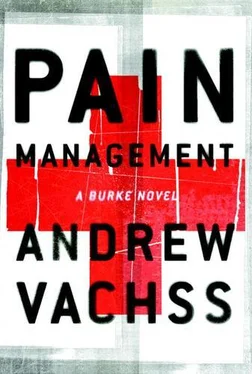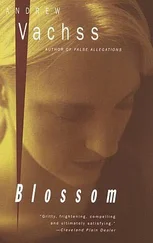“Well, given the circumstances . . .”
“I know. Kevin agreed, finally. But he just wasn’t comfortable with the whole thing. He insisted on being there every second. Not to look at anything himself,” she assured me, “to make certain the police were . . . respectful.”
“He’s a very protective father?”
“Oh, I wouldn’t say that. I think I’m more . . . strict with Rose than he could ever be. Kevin believes too much parental control stifles a child.”
“Do you want me to wait until your husband comes home to check Rose’s room?” I asked her bluntly.
“No . . . I don’t think so. I mean, Kevin knows you’re coming. And, anyway, you’re working for us, not the police, isn’t that correct?”
“I’ve got nothing to do with the police,” I said, making sure she got it. I knew better than to try and hold her eyes to emphasize the point. My eyes don’t track together ever since I took that coup de grâce bullet that hadn’t worked out like the shooter intended. People who try and stare me down get disconcerted pretty easy.
“All right, then. You can—”
She clamped her mouth shut suddenly as a little girl exploded into the room. The kid was maybe ten, wearing a red-and-white barber-pole-striped T-shirt and blue jeans. “Mom! Can I—?”
“Daisy, we have company. Do you think you can wait until I have—?”
The kid spotted me, whirled to bring me into focus. “What’s your name?” she demanded.
“B.B.,” I told her, pulling it out of the air.
“Like a BB gun?”
“Yep,” I said, going along.
“What happened to your face?”
“Daisy! What kind of question is that to ask our guest?”
The kid ignored her mother, watching me like she damn well expected an answer.
“I was in an accident,” I said, keeping my voice level and polite.
“Oh. A car accident?”
I nodded agreement, trying for gravity.
“How come your eyes are two different colors?” she demanded.
“That is it, young lady,” her mother said sharply.
“You’re here about Rose, aren’t you?” the kid asked me, hitting the mute to her mother’s station on some private remote.
“I am.”
“You’re the private detective!”
“That’s right.”
“And you think you’re going to find her?”
“I’m going to try.”
“The cops will never find her,” the child said solemnly.
“Why do you say that?”
“Because they don’t know her.”
“That makes sense, Daisy. And you know her, right?”
“Yes. We are very close,” the child said, smug and sad simultaneously. Proud of her adult phraseology . . . and terrified that she’d slip and use the past tense when she was referring to her sister.
“Then, later, you and me, we’ll talk, okay?”
“Okay,” she said, coming closer and sticking out her hand for me to shake. I did it, sealing the bargain. She whirled and charged out of the living room on full boil.
“I must apologize for—”
“She just wants to help,” I said to her mother. “And—who knows?—maybe she can.”
“I’m . . . not sure. She absolutely worships her sister, but I don’t think she could possibly know anything about . . . this.”
“It can’t hurt,” I assured the woman. “And it would make her feel better to be helping.”
“Do you want to see Rose’s room now?” she replied, moving me away from something that made her uncomfortable.
The girl’s room was on the second floor. Bigger than most Manhattan apartments, with its own attached bath. Between the skylight in the sloping ceiling and the triple-pane bay window, the room was flooded with natural light.
The furniture was a polyglot mixture of different woods and fabrics. The only linking theme was that it was all old. Looked like reconditioned flea-market stuff to me . . . except for a magnificent rolltop desk that stood in one corner, closed. As soon as I slid it open, I knew it was some kind of priceless antique: a maze of tiny, perfectly aligned drawers, each with a separate inlay, intricately rendered in contrasting woods, and miniature handles so small you’d need a toothpick to pull them open. The pigeonholes were widely varied in size. Reminded me of the California Job Case I was trained to work with in the institutional print shop when I was a kid. I couldn’t see the slightest trace of a nail. The whole piece was hand-finished to an artistic perfection beyond what any machine could hope to duplicate.
I’d heard that artists always sign their work, but I couldn’t see any evidence of that until I noticed the brass plate surrounding the keyhole had “Erwin Darrow” engraved on it. I’d heard that name before. Michelle once told me he was an American master, explaining why she’d laid out a couple of grand for a jewelry box he’d made. The desk probably cost enough to buy a nice car. But it fit right in with all the recycled stuff, somehow.
The double bed was covered with a bright patchwork quilt that showed more enthusiasm than expertise. One wall was papered with concert posters—Joni Mitchell, Tracy Chapman, Sinead O’Connor. Against the facing wall was a bookcase made of long bare planks laid over cinder blocks. The shelves were filled—mostly serious-looking trade paperbacks. Each rack was bookended with half of a large purple-and-white geode.
On the bottom shelf I saw a set of thick black books, about the size of airport paperbacks, but bound like hardbacks. The spines were blank. I picked one up, opened it. A notebook, the pages as empty as the spines had been. There were another half-dozen of them. All the same, the pages as unused as a pawnbroker’s heart.
The computer stood on one of those two-tiered workstations, an incongruously modern purple-and-white iMac . . . maybe to match the geodes? Above it was a pen-and-ink rendering mounted on some kind of artist’s board. A pair of crows perched on a high wire. It looked as if they were deep in conversation. The detail was incredible; you could see every feather. And the light-of-life in the birds’ eyes. In the lower right-hand corner it said: “Maida and Zia, 39/250, Geof Darrow.”
Darrow again. Was there any connection? Could the girl know their family or something? I filed it away, went back to work.
The phone was a relic—black Bakelite, with a large rotary dial. It perched on a thick pad of music composition paper. Blank. I moved the phone aside to take a closer look. Under the pad was a stack of comics. All issues of something called Cuckoo. Didn’t ring a bell with me.
“Is this the way Rose kept her room?” I asked the mother.
“What do you mean?”
“It’s incredibly neat; everything in its place. Looks like it’s ready for military inspection.”
“Oh,” she said, making a sound I didn’t recognize. “I see what you mean. Yes, Rose always kept her room immaculate. But that was her choice. Her father . . .”
It took me a few seconds to realize that the woman wasn’t going to say anything more. I stepped back to the desk, took a closer look. Inside, some of the pigeonhole slots were filled—envelopes, stamps, paper clips, a stapler—but most of them were empty. On the writing surface sat an old-fashioned green blotter with worn brown leather corners. Centered on the blotter was a pad of typewriter-sized paper, horizontally ruled in sets of five lines separated by white spaces. A square-cut glass inkwell stood guard to the side.
“Did Rose use a dip pen?” I asked the woman.
“I . . . don’t know.”
“Has anyone been in here since she left?”
“The police . . .”
“Sure. I mean, has anyone straightened up the room? A maid, maybe?”
Читать дальше











